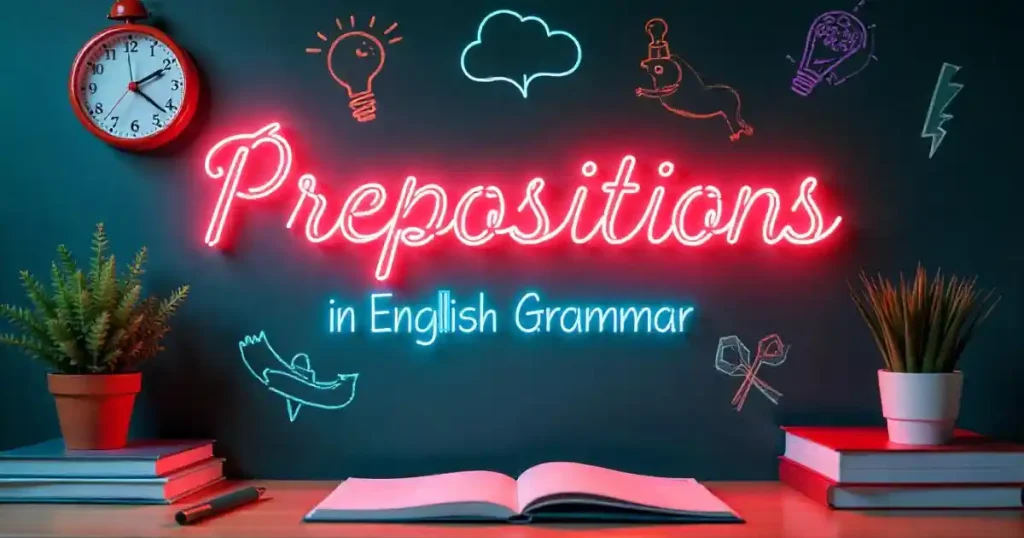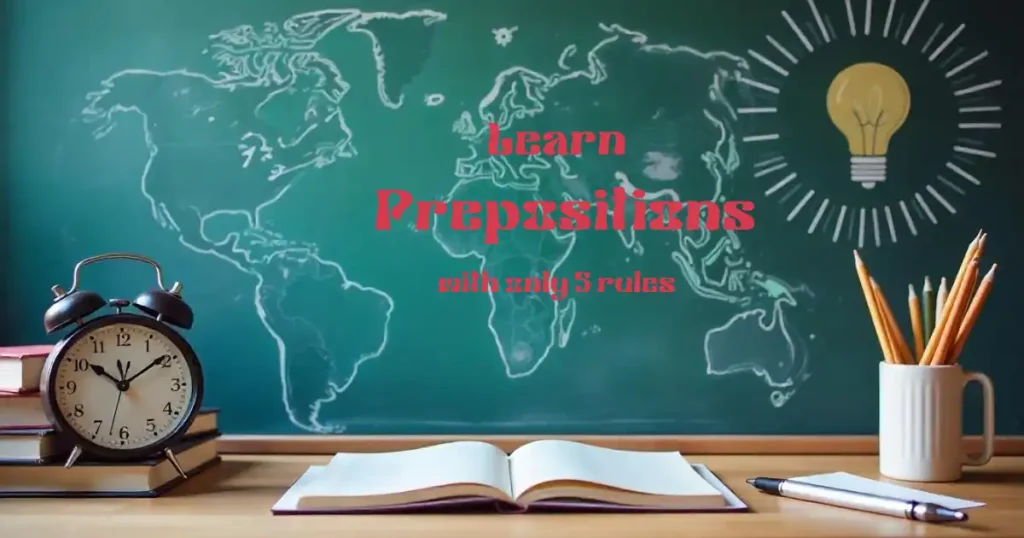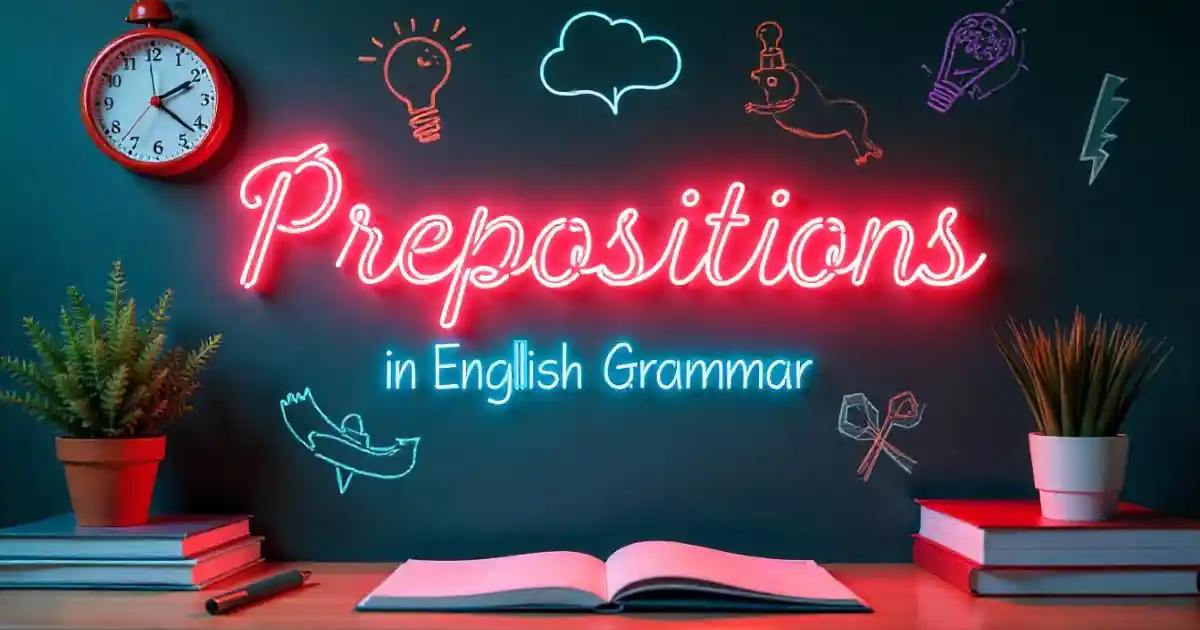Prepositions are essential parts of English grammar that connect nouns, pronouns, and phrases to other words in a sentence. They help show relationships in terms of time, place, direction, cause, manner, and instrumentality. Without prepositions, our sentences would lose clarity and structure.

For example, in the sentence “The book is on the table,” the preposition “on” indicates the position of the book. Similarly, in “She went to school,” the word “to” shows direction.
Prepositions are usually short words, such as in, on, at, to, for, from, of, by, with, and about. But their function is critical. Mastering prepositions is vital for speaking and writing English correctly and fluently. This is especially important for students preparing for SSC, HSC, or university entrance exams.
In this article, you’ll find detailed explanations, usage charts, and practice exercises to help you understand and use prepositions correctly in both academic and everyday English.
Read more – 15 Golden Rules for Using Articles in English Grammar
What is a Preposition?
A preposition is a word that shows the relationship between a noun or pronoun and another word in the sentence. It usually tells us about time, place, direction, cause, manner, and instrument.
In Bengali:
Preposition একটি শব্দ যা বাক্যে একটি noun বা pronoun-এর সাথে অন্য একটি শব্দের সম্পর্ক নির্দেশ করে।
Example:
- I eat rice.
(No preposition needed here because there’s no relational word between “rice” and “eat.”) - I play in the garden.
(‘In’ is a preposition showing place.)
Common Prepositions List:
Here are some of the most commonly used prepositions in English:
At, in, on, by, for, from, to, with, about, of, off, into, out, through, since, till, until, across, under, over, above, below, between, among, behind, around, before, after, without, inside, outside, against, up, fown, along

Types of Prepositions with Bengali Meaning and Examples:
1. Prepositions of Time:
| Preposition | Usage | Bengali Meaning | Example |
|---|---|---|---|
| At | Exact time, festival, short period | সময়, মুহূর্ত | He will meet me at 5 p.m. |
| On | Days, dates, special days | নির্দিষ্ট দিন | I was born on Friday. |
| In | Months, years, centuries | সময়কাল | She was born in March. |
| Since | Starting point of time (past) | থেকে | It has been raining since Monday. |
| For | Duration of time | সময়কাল | I have lived here for 2 years. |
| Till/Until | Up to a time | পর্যন্ত | Wait here till I come. |
2. Prepositions of Place:
| Preposition | Usage | Bengali Meaning | Example |
|---|---|---|---|
| At | Specific point | নির্দিষ্ট স্থান | She lives at Patuapara. |
| In | Inside an area or volume | ভিতরে | They are playing in the field. |
| On | Surface | উপর | The book is on the table. |
| By/Beside | Near | পাশে | He sat by me. |
| Under | Below something | নিচে | The shoes are under the table. |
| Above | Higher than | উপরে | The lamp is above the table. |
| Below | Lower than | নিচে | The valley is below the hill. |
| Behind | At the back of | পেছনে | He is standing behind the car. |
| In front of | Before something | সামনে | The car is in front of the house. |
| Inside | Within an enclosed space | ভিতরে | The key is inside the drawer. |
| Outside | Not inside | বাইরে | They are standing outside the house. |
Read more – The Parrot’s Tale – Analysis, Symbolism, and Political Satire U1L1
3. Prepositions of Direction or Movement:
| Preposition | Usage | Bengali Meaning | Example |
|---|---|---|---|
| To | Movement toward a place | দিকে | He went to school. |
| Into | Entry inside | ভিতরে প্রবেশ | She jumped into the pool. |
| Onto | Movement onto a surface | উপরে উঠা | The cat jumped onto the table. |
| Out of | Exit from inside | বাইরে আসা | He came out of the room. |
| Off | Away from a surface | আলাদা হয়ে যাওয়া | He fell off the ladder. |
| Across | From one side to another | পার হওয়া | She ran across the road. |
| Through | Movement within something | ভিতর দিয়ে | The car passed through the tunnel. |
| Along | Following a line | বরাবর | He walked along the river. |
4. Prepositions of Cause, Reason, Purpose:
| Preposition | Usage | Bengali Meaning | Example |
|---|---|---|---|
| Because of | Reason | কারণে | He failed because of his laziness. |
| For | Purpose | জন্য | I bought a gift for my friend. |
| Due to | Cause | কারণে | The match was canceled due to rain. |
5. Prepositions of Agent or Instrument:
| Preposition | Usage | Bengali Meaning | Example |
|---|---|---|---|
| By | Passive voice agent | দ্বারা | The letter was written by her. |
| With | Instrument used | দিয়ে | He cut the apple with a knife. |
Usage of Simple Prepositions:
At
| বাংলা অর্থ | ইংরেজি বাক্য |
| নির্দিষ্ট সময় | He will come at 5 p.m. |
| ছোট স্থান | I live at Patuapara. |
| দিক | Look at me. |
| নির্দিষ্ট মূল্য | I bought rice at 50 per kilo. |
| হার বা মুনাফা | I took the loan at 15% profit. |
In
| বাংলা অর্থ | ইংরেজি বাক্য |
| ভিতরে | He is in the room. |
| মাস/বছর/সময় | I was born in July. |
| শহর বা দেশ | They live in Dhaka. |
| সমস্যায় | We are in trouble. |
| কোনো পোশাকে | She came in a red dress. |
On
| বাংলা অর্থ | ইংরেজি বাক্য |
| উপর | The book is on the table. |
| নির্দিষ্ট দিন/তারিখ | The meeting is on Monday. |
| মিডিয়া/ডিভাইসে | I saw it on TV. |
| নির্ভর করে | The result depends on him. |
| পথে/ভ্রমণে | He is on his way to office. |
By
| বাংলা অর্থ | ইংরেজি বাক্য |
| দ্বারা (লেখক/কর্মী) | The book was written by Tagore. |
| বাহন/মাধ্যমে | She came by car. |
| নির্দিষ্ট সময়ের আগে | Finish the work by 6 p.m. |
| পাশে | He sat by me. |
| পার্থক্যের পরিমাণ | Prices increased by 10%. |
From
| বাংলা অর্থ | ইংরেজি বাক্য |
| উৎস থেকে | He came from Kolkata. |
| শুরু | The class starts from 8 a.m. |
| পার্থক্য বোঝাতে | She differs from her sister. |
| দূরে | Stay away from danger. |
| উপাদান বোঝাতে | Butter is made from milk. |
Of
| বাংলা অর্থ | ইংরেজি বাক্য |
| মালিকানা | The house of my uncle is very big. |
| উপাদান | This ring is made of gold. |
| বিষয়ে | I am proud of my country. |
| মৃত্যুর কারণ | He died of cancer. |
| অংশ বোঝাতে | A piece of cake. |
With
| বাংলা অর্থ | ইংরেজি বাক্য |
| সাথে | I went there with my friends. |
| কোনো কিছু দিয়ে | He cut the paper with a knife. |
| উপায় বোঝাতে | She solved it with ease. |
| মনোভাব বোঝাতে | He looked at me with anger. |
| বৈশিষ্ট্যসহ | A man with a long beard came in. |
Over
| বাংলা অর্থ | ইংরেজি বাক্য |
| উপরে (স্পর্শ না করে) | The fan is over my head. |
| বেশি | He is over 60 years old. |
| বিষয়ে | We talked over the phone. |
| নিয়ন্ত্রণ | He has control over the situation. |
| ছড়িয়ে পড়া | The news spread over the country. |
Under
| বাংলা অর্থ | ইংরেজি বাক্য |
| নিচে | The cat is under the table. |
| নিয়ন্ত্রণে | The work is under his supervision. |
| নির্দিষ্ট অবস্থায় | He is under pressure. |
| বয়সের সীমার নিচে | He is under 18. |
| প্রক্রিয়াধীন | The matter is under investigation. |
Into
| বাংলা অর্থ | ইংরেজি বাক্য |
| ভেতরে (গমন বোঝাতে) | He went into the room. |
| রূপান্তর | She turned into a great writer. |
| কোনো কিছুতে আগ্রহ | He is deeply into music. |
| বিশ্লেষণ | Let’s look into the matter. |
| পড়া বা পতন বোঝাতে | He fell into the river. |
Onto
| বাংলা অর্থ | ইংরেজি বাক্য |
| উপরে (গমন বোঝাতে) | He jumped onto the table. |
| উপর স্থানান্তর | Pour the water onto the floor. |
| আগমন বোঝাতে | The spotlight turned onto her. |
| বোঝার সূচনা | The police are onto something. |
| চাপ বা অবস্থান বোঝাতে | He climbed onto the roof. |
Through
| বাংলা অর্থ | ইংরেজি বাক্য |
| ভেদ করে | The sun is shining through the clouds. |
| কোনো কিছুর মাধ্যমে | I heard it through a friend. |
| এক পাশ থেকে অন্য পাশে | We walked through the forest. |
| অভিজ্ঞতার মাধ্যমে | He learned through hardship. |
| সম্পন্ন করে | He went through the whole book. |
Off
| বাংলা অর্থ | ইংরেজি বাক্য |
| থেকে পৃথক হওয়া | He fell off the ladder. |
| ছাড় | He is off duty now. |
| বন্ধ | The light is off. |
| থেকে দূরে | Keep off the grass. |
| থেকে সরানো | He took the book off the shelf. |
Out
| বাংলা অর্থ | ইংরেজি বাক্য |
| বাইরে | He went out of the room. |
| অচল/বন্ধ | The lights went out. |
| অনুপস্থিত | He is out today. |
| ফুরিয়ে গেছে | We are out of sugar. |
| প্রচারিত | The news is out now. |

Read more – Prepositions: Definition, Types, and Examples
Task-Based Preposition Practice:
Use appropriate prepositions from the box:at, in, on, to, by, with, of, off, into, from, since, for, about, among, between, under, behind, after, before, across, X
Fill in the blanks (choose the correct preposition):
- I live __________ Mirpur in Dhaka. (স্থান)
- It has been raining __________ two days. (সময়কাল)
- There are differences __________ honesty and dishonesty. (দুটি কিছুর মধ্যে)
- The books are __________ the table. (উপর)
- He invited me __________ the function. (কার্যক্রমে যোগ দিতে)
- I bought a pen __________ my brother. (কার জন্য)
- My father works __________ a bank. (কোথায় কাজ করেন)
- Snowboarding is different __________ skateboarding. (তুলনা)
- I am worried __________ my reading. (নিয়ে চিন্তিত)
- The environment consists __________ air and water. (কিসের দ্বারা গঠিত)
- Smoke is mainly produced __________ fire. (উৎস)
- The relation __________ men, environment and plants is known as ecology. (তিনটি উপাদানের সম্পর্ক)
- The normal __________ tolerance limit __________ sound is 45 decibel. (সীমা)
- The Taj Mahal is a symbol __________ universal love. (প্রতীক)
- My parents live __________ me. (সাথে)
- He is playing __________ skillfully. (ভঙ্গিতে)
- He is playing __________ skill. (দক্ষতা দিয়ে)
- He arranged __________ a drama. (কোন কিছু সংগঠিত করা)
- He told __________ me the matter. (কার কাছে বলা)
- I have broken __________ the chair. (কোন কিছুর সাথে ধাক্কা বা ভেঙে ফেলা)
Bengali to English Preposition Translation Task:
- সোমবারে
- টেবিলের নিচে
- সোমবার থেকে
- ৫০০ টাকার বিনিময়ে
- তোমার জন্য
- মাঠের বাহিরে
- আল্লাহর কসম
- তোমার সাথে
- সমাজের
- তোমার বাবার
- তোমার কাছ থেকে
- টেবিলের উপর
- গাছটির চারিপাশে
- তুমি ব্যতীত
- জানালার ভেতর দিয়ে
- রাস্তা বরাবর
- দুই ভাইয়ের মধ্যে
- ছেলেগুলোর মধ্যে
- আমাদের মনের
- দালানটির ভিতরে
- কবিতার উপর
- কবিতা সন্মন্ধে
- তোমার সমস্যার ব্যাপারে
- দুই দিন ধরে
- একতার উপর
- প্রাণীর জন্য
- ভালোবাসার
Tips for Mastering Prepositions:
- Practice daily: Learn with real-life examples.
- Make sentences: Practice creating your own sentences using new prepositions.
- Visualize: Draw diagrams to understand position-based prepositions.
- Revise regularly: Repetition helps with memorization.
- Take quizzes: Use task-based practice like the above to test understanding.
Final Words:
Prepositions are small words with big impact. Mastering them not only improves your grammatical accuracy but also enhances your writing and speaking skills. By understanding the usage of prepositions in time, place, direction, and context, you can speak and write English more fluently.
Do Yourself:
Fill in the gaps with prepositions:
Nowadays, science and technology pervade every aspect (a) _____ our life and, as a result, society is changing (b) _____ a great speed. There is a technological explosion (c) _____ us, generated (d) _____ science. This explosion is already freeing vast numbers of people (e) _____ their traditional bondage to nature.
Options: from, of, at, with, around, above, by
Fill in the gaps with prepositions:
You know that a modest man is not boastful (a) _____ anything. He is not proud (b) _____ his knowledge. He does not take pride (c) _____ his riches. Even he does not pride himself (d) _____ his success. He prefers honour (e) _____ money.
Options: under, on, to, out of, in, of
Fill in the gaps with prepositions:
I was there (a) _____ autumn. I wanted quiet isolation to do some troublesome writing. I wanted mountain air to blow (b) _____ malaria. I was homesick, too, (c) _____ the flaming of maples and for corn shocks, pumpkin, and black walnut trees. I found them all living in a cabin that belonged (d) _____ the orphanage. There I became acquainted (e) _____ a boy named Jerry.
Options: out, with, beyond, of, in, to, for
Fill in the gaps with prepositions:
The Eiffel Tower was named (a) _____ Gustave Eiffel, a Frenchman. He was born (b) ___ a prosperous family in 1832. He graduated (c) _____ the Central School of Engineering (d) _______ Paris and went to work (e) _____ a railway construction company.
Options: in, out, after, for, in, over, from
Fill in the gaps with prepositions:
We all are gifted (a) _____ wisdom. To leave it untapped and dormant is an abuse and an insult (b) _____ what we are born with. So we all should try to put our wisdom (c) _____ practice. This will obviously help us to bring (d) _____ our proper manifestation (e) _______ our inner and inherent wisdom.
Options: out, for, with, to, about, into, of
Fill in the gaps with prepositions:
It was very nice of you to have written to me. You will be glad to know that I got the first prize (a) _____ the debate competition on English of our college (b) _____ the topic “The Importance of Learning English.” I will now tell you (c) _____ brief what I said there. English is an international language. All that is best in modern civilization is available (d) ______ English. If we avoid English, we will keep ourselves aloof (e) ______ the civilized world.
Fill in the gaps with prepositions:
Thanks for your letter. I have learnt that you are keen (a) _____ learning English. I appreciate your interest. You can listen (b) ______ BBC, CNN and such other news, maintain a diary and write your feelings (c) _____ English. You should communicate (d) ____ others in English. Go ahead; I hope you will be successful.
Fill in the gaps with prepositions:
I am very glad to receive your letter (a) _____ time. You have stood first (b) _____ the examination. I would like to offer congratulations (c) _____ your grand success. We are really proud (d) ____ you. I hope you will do better (e) _____ your future examinations.
Fill in the gaps with prepositions:
Sorry for my unwilling delay to attend the function (a) ____ your residence. When I was ready (b) _____ the function, my father (c) _______ giving me any information, came to me. He had fallen seriously ill. So, I could not help taking him (d) _____ a clinic for immediate treatment. I hope I will visit you (e) _____ a week.
Fill in the gaps with prepositions:
The ceremony began (a) _____ 2 p.m. Our principal presided (b) _____ the function. The function started (c) ______ the recitation from the holy Quran. One of our senior teachers read (d) ____ the annual report. The deputy commissioner, the honorable chief guest, delivered a brief speech. He advised the students to be regular in studies and take part in the movement (e) _____ illiteracy.

